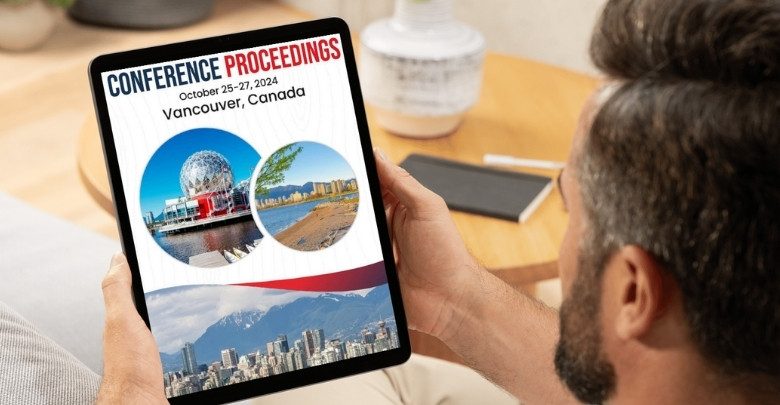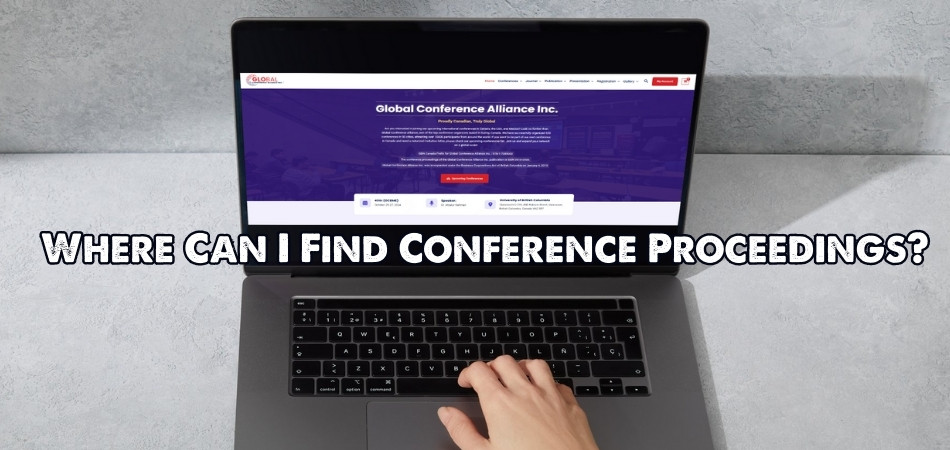Conference proceedings are collections of research papers presented at academic conferences. They offer valuable insights into the latest advancements in various fields and serve as an essential resource for researchers and professionals alike. If you’re wondering “Where can I find conference proceedings”, there are several places to explore.
Start by visiting the conference’s official website, as they often archive proceedings. Academic publishers like Springer and IEEE also host these papers, while platforms like ResearchGate, Academia.edu, and Google Scholar make them accessible online.
University libraries and institutional repositories are additional sources for finding conference papers. For more detailed guidance on accessing these valuable resources, continue reading the rest of this article.
What’s the Purpose of Conference Proceedings?
Conference proceedings showcase groundbreaking research and ideas, offering academics and professionals a platform to share knowledge. They act as a record, preserving details of presentations and discussions held at the event.

Researchers gain visibility by publishing their work in these proceedings, which boosts their reputation. Moreover, participating on a reliable conference helps researchers connect with peers and advance their field’s collective knowledge.
Attending conferences also allows participants to keep up with new trends and evolving methodologies in their area. The proceedings capture diverse topics, ensuring access to fresh perspectives and insights.
They serve as valuable references for students, researchers, and professionals, supporting ongoing learning and research. Overall, conference proceedings contribute to knowledge exchange and foster growth across various disciplines.
Where Can I Find Conference Proceedings?
Conference proceedings are invaluable resources for staying updated on cutting-edge research. Knowing where to find them is essential for researchers and professionals. Below are the key places to look:
Conference – Based Websites
Most conferences publish their proceedings on their official websites, often in the “Publications” or “Proceedings” section. Start by exploring the conference organizer websites, such as Global Conference Alliance Inc., known for its vast archives.
These sites usually provide access to recent and past conference papers. If you’re interested in keeping up-to-date with academic events, you can also find upcoming scopus indexed conferences, which often provide proceedings through their portals or partnering academic publishers. Exploring these resources is the best first step when searching for specific proceedings.
Academic Publishers
Major academic publishers like Springer, IEEE, and Elsevier host extensive collections of conference proceedings. For example, IEEE Xplore is a digital library that offers a vast array of conference papers. These platforms are reliable sources, especially for technical and scientific conferences. You may need a subscription or institutional access to retrieve full papers.
University Libraries
University libraries are excellent resources, often subscribing to databases that include conference proceedings. Checking your university’s library catalog can yield significant results. Librarians are valuable allies in navigating these resources effectively. These libraries frequently provide access to otherwise restricted content.
ResearchGate and Academia.edu
Researchers frequently upload their conference papers to platforms like ResearchGate and Academia.edu. These sites enable broader access to valuable research. Many researchers share their work here to reach a wider audience. It’s a good alternative if you’re looking for specific papers not easily found elsewhere.
Google Scholar
Google Scholar is a powerful tool for locating academic papers, including conference proceedings. You can search by keywords, author names, or specific conference titles. It aggregates content from various sources, making it convenient to use. It’s a versatile starting point for broader research inquiries.
Institutional Repositories
Many universities and research institutions maintain repositories where they archive their researchers’ work, including conference proceedings. These repositories are often open-access, meaning you can view the papers without restrictions. They are particularly useful for finding papers from specific institutions. Starting here can save time if you know the author’s affiliation.
Finding conference proceedings might require a bit of digging, but these sources will guide you in the right direction. Whether you’re a student, researcher, or professional, having access to these resources is invaluable for staying informed and engaged with the latest developments in your field.
Can I Access Conference Proceedings for Free?
Yes, you can access conference proceedings for free, but it’s not always straightforward. Availability depends on the source, the conference, and its access policies. While some proceedings are free online, others may need subscriptions or special access.
Open Access Options
Some conferences and institutions publish proceedings openly to boost accessibility and academic sharing. Websites like conference archives or university repositories often offer free papers. Exploring such sources can help you identify conference proceedings that are available to everyone. Using these resources can help researchers save on subscription costs while still accessing valuable work.
Subscription and Institutional Access
Many conference proceedings are behind paywalls, especially those published by major journals. Libraries in universities often provide access to these with institutional subscriptions. If you’re affiliated with a school or organization, check if you have access through them. This option offers comprehensive access to otherwise costly academic resources.
Knowing Where to Look
Locating free conference proceedings requires exploring multiple sources across the web. Reliable academic sites, open-access platforms, and conference websites are good places to start. Checking these regularly can reveal newly published proceedings that might be freely accessible. Consistently looking across sites can enhance your chances of finding free content.
Using Specialized Databases
Certain databases focus exclusively on aggregating conference proceedings, making it easier to find relevant papers. These databases often list both open-access and subscription-based resources. By navigating through these, you can locate valuable proceedings and access them when possible. Resources like IEEE Xplore and SpringerLink are popular databases with extensive collections.
Leveraging Professional Networks
Professional networks, like LinkedIn or ResearchGate, can sometimes lead to free access to conference proceedings. Researchers frequently share their work directly or offer links to open-access versions. Additionally, contacting authors directly on these platforms can help you obtain full papers if needed. Networking within academic communities can be an effective approach for accessing specific conference work.
Exploring Conference Websites
Visiting conference websites directly often reveals free content, especially for recently held events. Many conferences publish abstracts or key papers openly as part of their outreach. Some conferences also offer initial open access, allowing free downloads for a limited period. Regularly checking these sites can help you access recent proceedings without cost.
Tips to Help You Manage Conference Proceeding Databases
Managing conference proceeding databases efficiently is crucial for staying organized and finding relevant research quickly. Here are some practical tips to help you utilize and maintain these valuable resources:
- Organize by Conference and Year: Label your files by conference name and year for easy retrieval later. This system simplifies tracking and searching for specific proceedings.
- Use Descriptive File Names: Include keywords, authors, and topics in your file names. This practice speeds up and improves the efficiency of searching within your database.
- Create a Searchable Index: Maintain a simple spreadsheet to catalog your proceedings. Include fields like title, authors, conference, and keywords for quick reference.
- Regularly Update Your Collection: Check for new proceedings and add them to your database regularly. Keeping your collection current ensures you have the latest research available.
- Leverage Citation Management Tools: Tools like Zotero or EndNote help you manage citations. These tools also assist in organizing and retrieving conference papers quickly.
Efficiently managing conference proceeding databases saves time and enhances your research productivity. By implementing these tips, you can easily access and organize valuable research resources, ensuring a well-maintained collection for future use.
How Can the Conference Proceedings Benefit You?
Researchers, professionals, and students can benefit greatly from conference proceedings. They provide access to cutting-edge research and foster academic and professional development. Here are the key advantages of engaging with conference proceedings.
Access to Cutting-Edge Research
Conference proceedings present the latest findings from various fields. They often include preliminary results that have not yet been published in journals. Accessing these proceedings helps you stay ahead of current trends.
Engaging with conference proceedings allows you to discover innovative methodologies. You can apply these new techniques to your own research. This exposure can significantly enhance the quality of your work.
Networking and Collaboration Opportunities
Reading conference proceedings connects you with researchers working on similar topics. This can open doors for collaborations and networking opportunities. Building such connections is essential for academic and professional growth.
Proceedings often list authors’ contact information, facilitating direct communication. Reaching out to these researchers can lead to fruitful discussions. Networking through proceedings can also lead to potential partnerships.
Enhancing Your Knowledge Base
Conference proceedings broaden your understanding of your field. They expose you to diverse perspectives and approaches. This expanded knowledge base is valuable for developing well-rounded expertise.
Engaging with a wide range of papers deepens your insight. You learn about various challenges and solutions proposed by others. This comprehensive understanding is crucial for tackling complex research problems.
Informing Your Own Research
By reviewing conference proceedings, you can identify gaps in the current research. This helps you pinpoint areas that need further exploration. Informing your research in this way ensures its relevance and originality.
Proceedings provide a benchmark for your work. Comparing your research with others helps you refine your hypotheses and methods. This iterative process enhances the rigor and impact of your research.
Preparing for Future Conferences
Studying past proceedings prepares you for attending future conferences. You gain insights into common themes and presentation styles. This knowledge helps you better prepare and participate effectively.
Understanding what has been presented previously guides your own submissions. You can tailor your research to address gaps and emerging topics. This strategic approach increases the likelihood of acceptance and recognition.
FAQS about Where Can I Find Conference Proceedings?
Conference proceedings are vital resources for researchers and professionals looking to stay updated on the latest advancements in their fields. Below are six frequently asked questions about finding conference proceedings, along with concise answers.
Where Is the Best Place to Start Searching for Conference Proceedings?
Start with the official website of the conference. Many conferences archive their proceedings in the “Publications” or “Proceedings” section, providing direct access to papers presented at the event.
Can I Find Conference Proceedings in University Libraries?
Yes, many university libraries subscribe to databases that include conference proceedings. You can search your university’s library catalog or consult a librarian for assistance in accessing these valuable resources.
Are Conference Proceedings Available on Academic Publishing Platforms?
Yes, major academic publishers like Springer, IEEE, and Elsevier host conference proceedings. These platforms often require a subscription or institutional access, but they offer extensive collections of papers from various conferences.
How Can I Find Free Conference Proceedings Online?
Platforms like ResearchGate and Academia.edu often have free versions uploaded by the authors themselves. Google Scholar is also a useful tool to find openly accessible conference papers from various sources.
Is It Possible to Access Conference Proceedings Through Institutional Repositories?
Yes, many universities and research institutions maintain repositories where they archive their researchers’ conference papers. These repositories are often open-access, making them an excellent resource for freely accessing conference proceedings.
What Role Does Google Scholar Play in Finding Conference Proceedings?
Google Scholar aggregates academic content, including conference proceedings, from various sources. It’s a versatile tool that allows you to search by keywords, authors, or specific conference names, making it easier to locate relevant papers.
Endnotes
For those seeking to stay up-to-date with the latest developments in their fields, conference proceedings are essential tools. They offer a wealth of information and opportunities for networking, collaboration, and professional growth.
If you’re asking, “Where can I find conference proceedings?” exploring conference websites, academic publishers, and online platforms like Google Scholar will lead you in the right direction.
By efficiently managing and utilizing these resources, you can enhance your research, broaden your knowledge, and prepare effectively for future academic or professional engagements. Embracing these strategies will keep you informed and ahead in your field.







